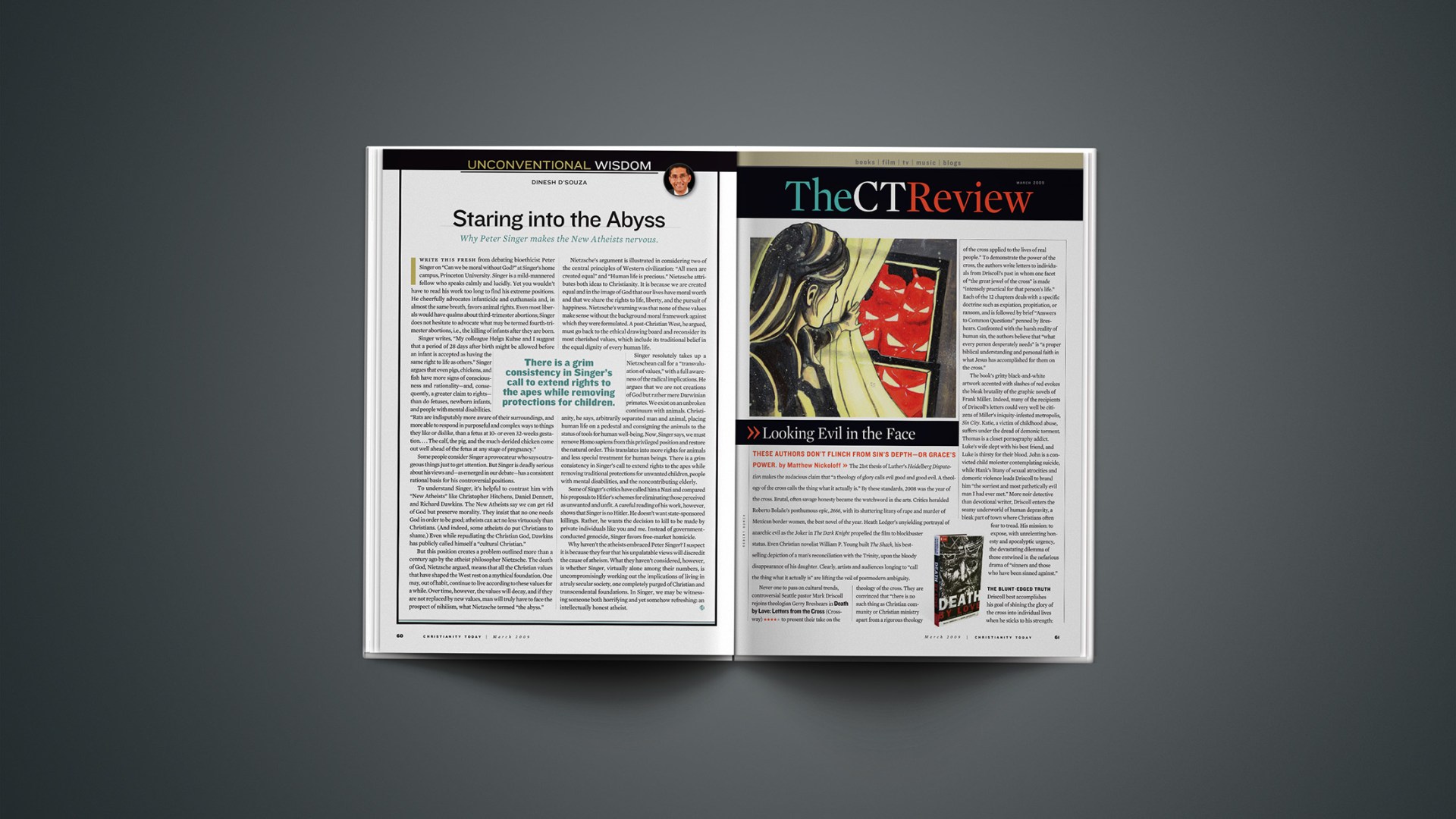I write this fresh from debating bioethicist Peter Singer on “Can we be moral without God?” at Singer’s home campus, Princeton University. Singer is a mild-mannered fellow who speaks calmly and lucidly. Yet you wouldn’t have to read his work too long to find his extreme positions. He cheerfully advocates infanticide and euthanasia and, in almost the same breath, favors animal rights. Even most liberals would have qualms about third-trimester abortions; Singer does not hesitate to advocate what may be termed fourth-trimester abortions, i.e., the killing of infants after they are born.
Singer writes, “My colleague Helga Kuhse and I suggest that a period of 28 days after birth might be allowed before an infant is accepted as having the same right to life as others.” Singer argues that even pigs, chickens, and fish have more signs of consciousness and rationality—and, consequently, a greater claim to rights—than do fetuses, newborn infants, and people with mental disabilities. “Rats are indisputably more aware of their surroundings, and more able to respond in purposeful and complex ways to things they like or dislike, than a fetus at 10- or even 32-weeks gestation. … The calf, the pig, and the much-derided chicken come out well ahead of the fetus at any stage of pregnancy.”
Some people consider Singer a provocateur who says outrageous things just to get attention. But Singer is deadly serious about his views and—as emerged in our debate—has a consistent rational basis for his controversial positions.
To understand Singer, it’s helpful to contrast him with “New Atheists” like Christopher Hitchens, Daniel Dennett, and Richard Dawkins. The New Atheists say we can get rid of God but preserve morality. They insist that no one needs God in order to be good; atheists can act no less virtuously than Christians. (And indeed, some atheists do put Christians to shame.) Even while repudiating the Christian God, Dawkins has publicly called himself a “cultural Christian.”
But this position creates a problem outlined more than a century ago by the atheist philosopher Nietzsche. The death of God, Nietzsche argued, means that all the Christian values that have shaped the West rest on a mythical foundation. One may, out of habit, continue to live according to these values for a while. Over time, however, the values will decay, and if they are not replaced by new values, man will truly have to face the prospect of nihilism, what Nietzsche termed “the abyss.”
Nietzsche’s argument is illustrated in considering two of the central principles of Western civilization: “All men are created equal” and “Human life is precious.” Nietzsche attributes both ideas to Christianity. It is because we are created equal and in the image of God that our lives have moral worth and that we share the rights to life, liberty, and the pursuit of happiness. Nietzsche’s warning was that none of these values make sense without the background moral framework against which they were formulated. A post-Christian West, he argued, must go back to the ethical drawing board and reconsider its most cherished values, which include its traditional belief in the equal dignity of every human life.
Singer resolutely takes up a Nietzschean call for a “transvaluation of values,” with a full awareness of the radical implications. He argues that we are not creations of God but rather mere Darwinian primates. We exist on an unbroken continuum with animals. Christianity, he says, arbitrarily separated man and animal, placing human life on a pedestal and consigning the animals to the status of tools for human well-being. Now, Singer says, we must remove Homo sapiens from this privileged position and restore the natural order. This translates into more rights for animals and less special treatment for human beings. There is a grim consistency in Singer’s call to extend rights to the apes while removing traditional protections for unwanted children, people with mental disabilities, and the noncontributing elderly.
Some of Singer’s critics have called him a Nazi and compared his proposals to Hitler’s schemes for eliminating those perceived as unwanted and unfit. A careful reading of his work, however, shows that Singer is no Hitler. He doesn’t want state-sponsored killings. Rather, he wants the decision to kill to be made by private individuals like you and me. Instead of government-conducted genocide, Singer favors free-market homicide.
Why haven’t the atheists embraced Peter Singer? I suspect it is because they fear that his unpalatable views will discredit the cause of atheism. What they haven’t considered, however, is whether Singer, virtually alone among their numbers, is uncompromisingly working out the implications of living in a truly secular society, one completely purged of Christian and transcendental foundations. In Singer, we may be witnessing someone both horrifying and yet somehow refreshing: an intellectually honest atheist.
Dinesh D’Souza, a former policy analyst in the Reagan White House, is author of What’s So Great About Christianity and other books.
Copyright © 2009 Christianity Today. Click for reprint information.
Related Elsewhere:
What’s so Great About Christianity can be purchased at ChristianBook.com and other book retailers.
D’Souza previously wrote “The Evolution of Darwin.”
Christianity Today also has a special section on atheism.










